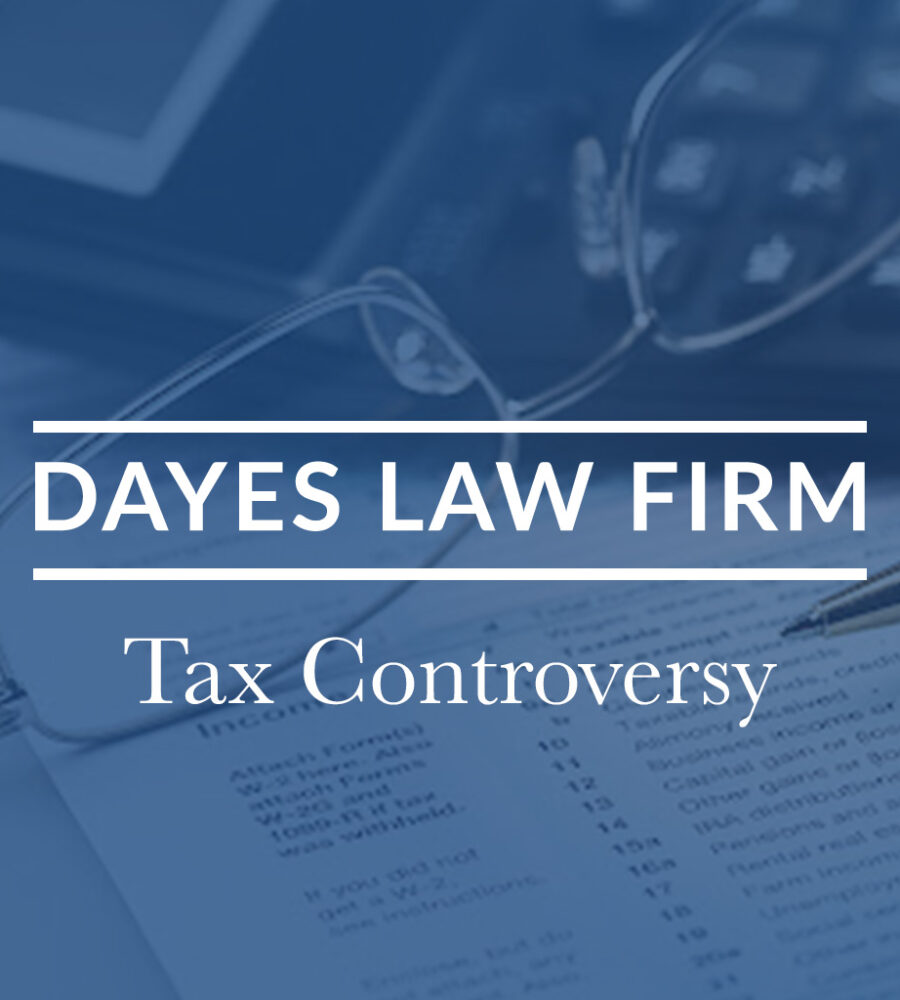ERC Compliance
Maximize Your Employee Retention Credit with Expert ERC Compliance Services
Navigating the complexities of the Employee Retention Credit (ERC) can be challenging, but you don’t have to do it alone. At Dayes Law Firm, we have a seasoned team of attorneys that work in ERC compliance, helping businesses maximize their tax credits and ensure full compliance with IRS regulations. Our experienced tax attorneys are here to provide you with the guidance and support you need to take full advantage of the ERC.
Fill out the form below for your Free Consultation!
Free Consultation
Why Choose Us?
Experienced Tax Professionals: Our team comprises seasoned tax attorneys and professionals with extensive knowledge of ERC regulations and compliance requirements. We stay updated with the latest IRS guidelines to ensure your business benefits from the ERC.
Tailored Solutions: We understand that each business is unique. We take the time to understand your specific circumstances and develop a customized strategy to optimize your ERC claims.
Comprehensive Support: From initial consultation to the final submission, we handle every aspect of the ERC compliance process, ensuring accuracy and compliance with IRS rules.
Proven Success: Our commitment to excellence and client satisfaction drives us to deliver successful results. We work diligently to maximize your ERC claims and support your business’s financial health.
ERTC (Employee Retention Tax Credit) funds provide a valuable financial boost for businesses, allowing them to retain employees during challenging economic times.
These funds can be used to cover a variety of essential expenses, including payroll costs, employee benefits, and other operational expenses. By alleviating financial strain, ERTC funds enable businesses to maintain their workforce, invest in growth initiatives, enhance their services, and ultimately stabilize and strengthen their overall financial health.
This support is crucial for sustaining business operations and ensuring long-term success.
What is the Employee Retention Credit (ERC)?
The Employee Retention Credit (ERC) is a refundable tax credit designed to encourage businesses to keep employees on their payroll during the COVID-19 pandemic. The credit is available for wages paid to eligible employees during specified periods in 2020 and 2021. Businesses can claim the ERC to reduce their employment tax liabilities and receive a refund for excess credits.
Our ERC Compliance Services
Eligibility Assessment: We start with a thorough review of your business operations and payroll records to determine your eligibility for the ERC. We ensure that all qualifying criteria are met to maximize your credit.
Documentation Preparation: Our attorneys assist in gathering and preparing all necessary documentation to support your ERC claim, including payroll records, financial statements, and other relevant documents.
Claim Calculation: We meticulously calculate your ERC to ensure you claim the maximum credit available. Our calculations are based on the latest IRS guidelines and regulations.
IRS Submission: We handle the submission of your ERC claim to the IRS, ensuring all forms and documents are accurately completed and submitted in a timely manner.
Audit Support: In the event of an IRS audit, we provide expert representation and support. We help you respond to IRS inquiries and defend your ERC claims, ensuring a smooth audit process.
Ongoing Compliance Monitoring: We offer ongoing monitoring and compliance services to ensure your business continues to meet ERC requirements and benefits from all available tax credits.
Questions? Dayes Law Firm Has The Answers
The IRS will be looking for information to determine eligibility for the credit. This information will include financial information including gross revenue, profits and loss statements, payroll information and tax returns including income and payroll returns. In addition, the IRS will want information about PPP loans, if taken, and if the taxpayer uses the Government Shutdown Test, all the appropriate governmental orders that affected the business.
The IRS has not released the reasons for why any particular business was picked for an audit. However, there might certain indicators of why. If the amount of the credit does not make sense with the previously provided payroll returns this is likely a red flag. If your business was in an area that was overly affected this might be a red flag. The luck of the draw was not on your side. The IRS picks a small percentage of returns to be audited even if there does not appear to be any discrepancies.
Picking the best representatives who have experience in not just audits but specifically ERC audits is a good start. The ERC includes a lot of very technical qualifications that if they are not understood, the taxpayer is likely to lose the audit even if they should qualify. Having representation that understands the nuances of the law as well as the various notices put out by the IRS is the quickest way to success.
There are few choices left to the taxpayer at this point. First the taxpayer can appeal the case to the Appeals Division of the IRS. An appeal can take upwards of 6 months for the Appeals Division to take up the claim. The Appeals Division has the ability to negotiate a “settlement” with the taxpayer as they are required to undertake an analysis that includes litigation risks. Another option is to file a refund action in Court. This can happen after an appeal. Another option is to not fight the findings and either pay off the debt or if nothing is owed to let it go. If the taxpayer is unable to pay the entire amount of the taxes owed, the taxpayer can potentially enter into an agreement with the IRS to pay off the debt in installments.




